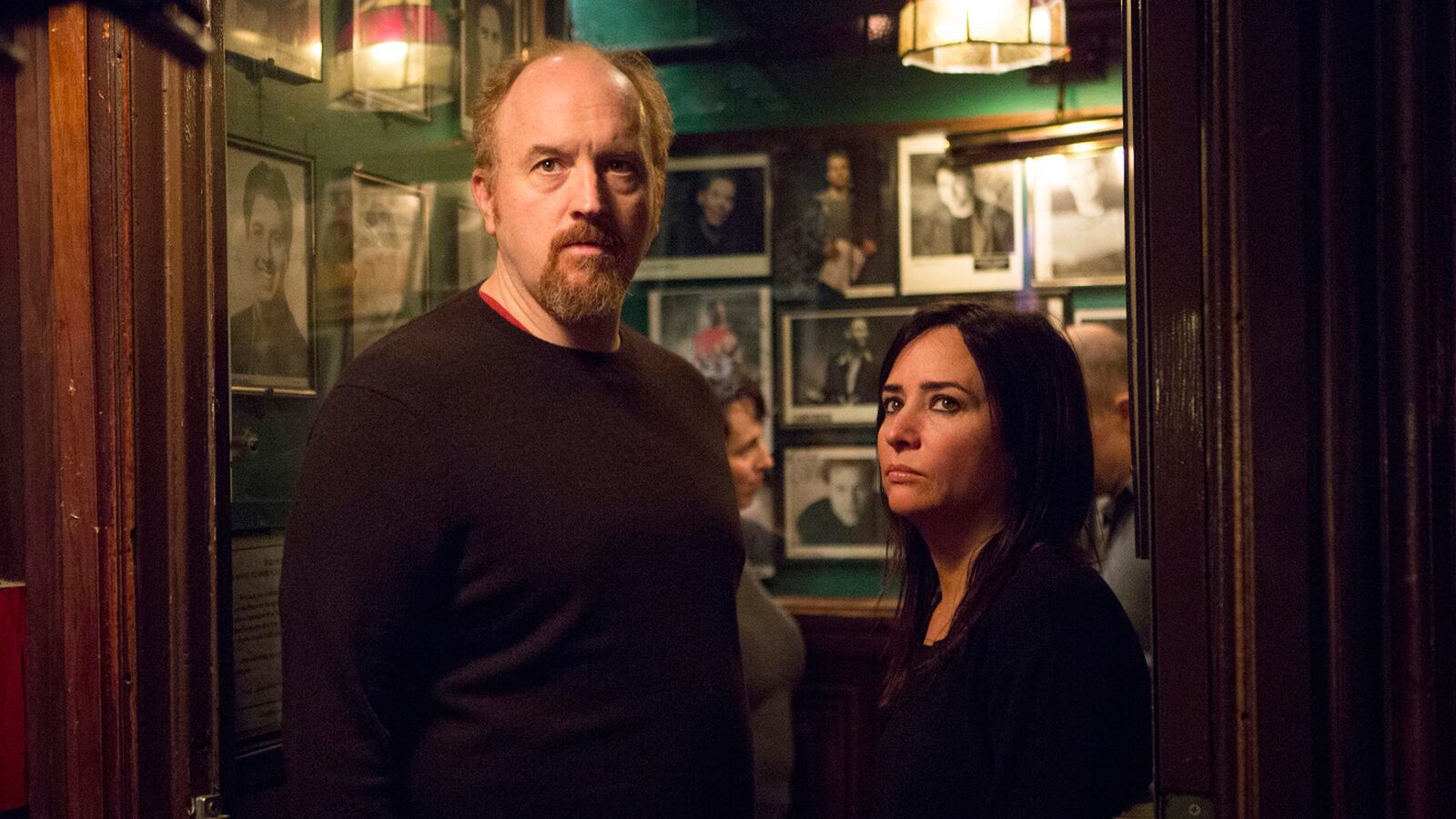I was ready to do it. I swear. I was right on the verge of breaking up with Louis C.K.—America’s Undisputed King of Comedy, at least according to the cover of GQ magazine and pretty much every other critic alive. Or at least I was ready to take a break.

And then I watched tonight’s two-part Louie season finale, and I couldn’t help but fall in love with the guy all over again.
Let’s rewind for a second. Back in May, I wrote a very positive review of the first four episodes of Season 4, which I had magically seen before the rest of America (because FX had emailed them to me). My review basically had two points. The first was that Louie was still the same brilliant show it had always been: the same extended, often surreal vignettes; the same stand-up interludes; the same loose vérité style; the same occasional—but only occasional—serialized story arcs; and the same Louie, shuffling around Manhattan and caring for his daughters and winding up as the butt of one big existential joke after another.
The second point was my theory about why Louis C.K. had become the most preeminent comedian of his generation: because he uses humor as a kind of contemporary moral compass designed to orient us wherever we need it most... right now, in 2014. “A lot of comedians can make you laugh,” I continued. “The difference with C.K. is that his best jokes—the ones in which you recognize your own absurdity or confusion; the ones you remember whenever your own life gets absurd or confusing—have the power to make you a little bit more human, and a little bit less of whatever else it is we’re becoming.”
But a funny thing happened as Season 4 progressed: I began to realize that in some sense, I was wrong on both counts. One of the problems with the otherwise wonderful way that we watch TV now—that is, around the online watercooler, with critics and fans weighing in after each installment—is that for a show as ambitious as Louie, the episode isn’t the only worthwhile unit of measure. The season also has its own integrity. As a result, reviewing each half-hour in real time can be a bit like reviewing each chapter of a book right after you finish it: There’s something to be said for waiting to pass judgment until the entire story has been told.
In this case, the more story I saw, the more I noticed that Season 4 wasn’t exactly like the seasons that came before it. It was different. And the way it was different had a lot to do with the moral perceptiveness—and prescriptiveness—that I had already identified as the hallmark of C.K.’s comedy. On earlier seasons of Louie, the humor and the morality were in perfect symbiotic balance. The former made the latter more palatable; the latter made the former more memorable. But somewhere around the middle of Season 4, the balance was upset, and C.K. stopped affixing punchlines to most of his sermons.
I first sensed the shift in “So Did the Fat Lady,” a widely praised episode that ends with a monologue by a waitress named Vanessa (Sarah Baker) who’s fed up with men like Louie who ignore her because she’s fat. I agreed with my colleague Amy Zimmerman that the speech “made some really powerful points about gender, media, and American standards of beauty, all while avoiding the common traps of stereotyping or mansplaining.” But I also thought that it seemed too aware—even proud—of the fact that it was making those points, and that self-conscious, self-congratulatory tone drew me out of the situation I was seeing on screen and into the seminar room. The content of Vanessa’s lecture was important and true, but it would have been even more indelible if it hadn’t felt like a lecture at all. Humor is one way of doing that—of showing and not telling—and C.K. certainly could have employed it here. That’s his forte. But he chose not to.
I wondered why—until I watched C.K. do the same thing again and again. He did it in “Pamela 1” (i.e., the one in which he explored rape culture and the “nice guy” mentality). He did it throughout the six “Elevator” episodes (the ones about Louie’s desperate relationship with his Hungarian neighbor, Amia). But most of all he did it in “In the Woods,” a misguided 90-minute flashback about young Louie’s experiences with marijuana. The episode was supposed to play like some sort of autobiographical auteurist experiment, but it was so boring, humorless, and pedantic—Louie does drugs; Louie steals scales from his school to pay for his drugs; Louie gets caught; Louie realizes that he’s in over his head—that it felt more like a mediocre after-school special instead. Seriously—“In the Woods” was some of the most self-indulgent TV I'd ever seen.
Why is C.K. sabotaging himself like this? I thought at the time. Why is he dialing down the humor and dialing up the moralizing, throwing his immaculate comedic balance out of whack? The answer, I realized, is that deep down, C.K. doesn’t really trust comedy at all. A joke is a functional thing. It has to work; it has to make people laugh. But a true artist doesn’t have to please anyone but himself. And as Andrew Marantz recently wrote on The New Yorker’s website, “This is C.K.’s motivating anxiety—the most conventional of anxieties, but no less powerful for being a cliché: his desire to be recognized, despite a thin C.V., as an artist.”
His life choices left him with a chip on his shoulder. In his recent HBO special, C.K. said, “A 55-year-old garbage man is a million times smarter than a 28-year-old with three Ph.D.s. Especially smarter than him, because this idiot has been thinking about three things for, like, 15 years.” This is C.K.’s rebuke of his father, [a Harvard-trained economist] with whom he has a troubled relationship. It is also self-justification: I may not have studied Hegel and Uta Hagen, C.K. is saying, but I have slept in musty motels in 50 states, and I have crashed a motorcycle, and I once found a computer on the street and reassembled it by hand, and that makes me a more interesting artist.
Which brings us, finally, to “Pamela Part 2” and “Pamela Part 3.” I’ll tell you the truth: as I sat down to watch Louie’s finale episodes Monday night, I expected more of the same. More seriousness, more Issues, more auteurism—and less laughter. But what I got was the opposite. Over the course of about 50 minutes, Louie and his reluctant longtime crush Pamela (played with acerbic toughness by Pamela Adlon) haltingly crossed the line from friendship to "relationship." Their first date was telling: they stumbled into a contemporary white-cube art gallery and proceeded to giggle their way past neon nooses, a bag of poop, and an all-black canvas entitled “Jews.” I read the scene as a corrective of sorts: an admission from C.K. that a lot of what passes as Art is just self-involved posturing—including, at times, his own Art. Making people laugh is an art, too.
The rest of Louie and Pamela’s courtship bore this out. The shooting stars in Central Park. The antique furniture shopping. The show-and-tell camera phone seduction. The clumsy sex on the floor. The encounter with Louie’s ex. The pep talk in the alley after Louie’s show. All of it was touching and funny and irresistibly human. And yet the finale still made an important point, like much of the rest of Season 4, about gender: Much of what we see as masculine and feminine in a relationship is BS. Louie is the one who says "I love you"; Pamela is the one who resists. Pamela is the one who ultimately initiates sex; Louie follows her lead. And in the season’s remarkable final scene, Louie is the one who is uncomfortable with his body—and Pamela is the one who assures him that he’s beautiful. None of this feels like a lecture. It’s too light, too organic, and ultimately too enjoyable for that. Showing, not telling. It was my favorite romantic comedy of the year.
I’m tempted to say that I wish more of Season 4 had unfolded like Monday’s episodes. But the more I think about it, the more I’m thankful for Louie’s excesses and missteps. It’s rare that we get to see an artist of C.K.’s caliber working out what he wants to say and how he wants to say it on TV every week—without any interference from focus groups or meddling executives. Louie is C.K., artistic pretensions and all. A more polished, less personal production may not have uncorked a stinker like “Into the Woods”—but it wouldn’t have scaled the finale’s lofty heights, either. That’s a tradeoff I’m more than willing to make.





